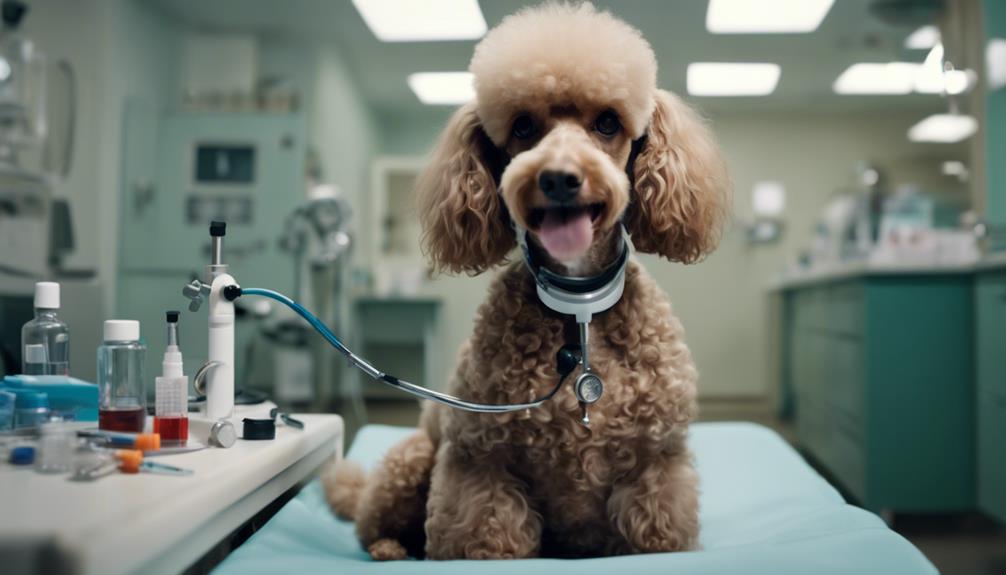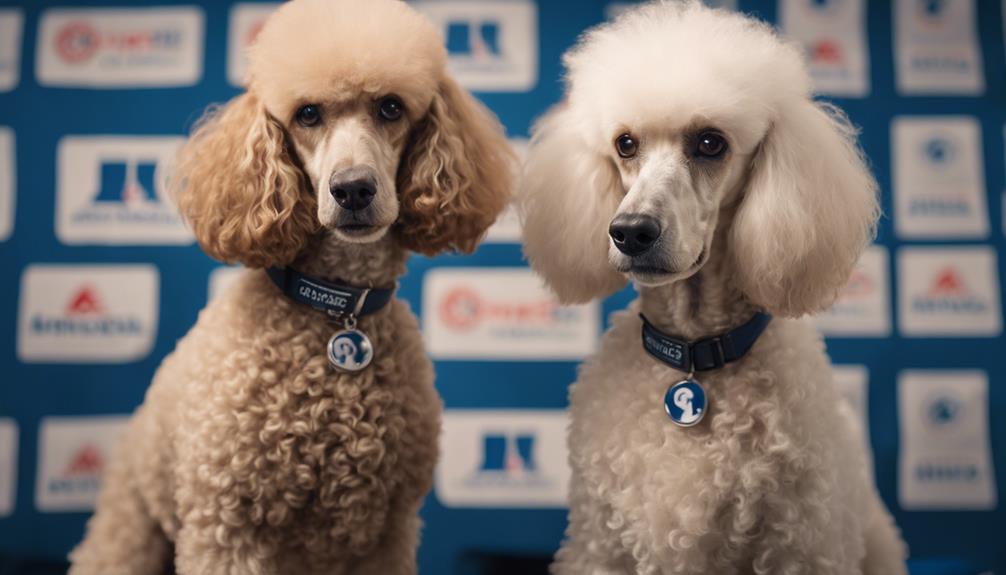Wondering how to ensure your Poodle's health is protected without breaking the bank? Understanding the ins and outs of Poodle health insurance is crucial. From coverage options to choosing the right plan, there's a lot to consider. But what if you could navigate this complex terrain with confidence and clarity? You're about to uncover essential tips that will help you make informed decisions about your furry friend's healthcare.
Key Takeaways
- Choose tailored accident and illness plans for comprehensive coverage.
- Understand deductible options to align with budget and needs.
- Regular vet check-ups are crucial for early detection and prevention.
- Review policies for coverage of common Poodle health conditions.
Poodle Health Insurance Coverage Options

When considering Poodle health insurance coverage options, it's essential to explore tailored accident and illness plans designed to address their specific breed-related health needs. Poodle health insurance from reputable pet insurance companies often includes coverage for common issues like hip dysplasia, epilepsy, and hypothyroidism. These specialized insurance plans not only cater to the unique health concerns of Poodles but also cover a range of treatments, medications, and surgeries related to these conditions. By opting for a Poodle-specific health insurance policy, you can ensure that your furry companion receives the necessary care without worrying about the financial implications. Additionally, some insurance providers offer preventative care packages as part of their Poodle health insurance, which can assist in managing routine health needs and scheduling regular wellness check-ups. Understanding the intricacies of Poodle health insurance coverage options empowers you to make informed decisions that prioritize your pet's well-being and provide comprehensive healthcare when needed.
Factors to Consider When Choosing Insurance

To choose the right insurance coverage for your Poodle, carefully assess factors such as age, breed size, and any pre-existing conditions they may have. When considering pet insurance plans, look for Poodle-specific options that cater to the unique needs of this breed. Evaluate the average monthly premiums for accident and illness plans tailored to Poodles, ensuring that they cover common health issues like hip dysplasia and hypothyroidism. Compare coverage limits and reimbursement rates to guarantee adequate financial protection for your furry companion. Additionally, check for any age and breed restrictions that may impact your Poodle's eligibility for certain insurance plans. By taking into account these essential factors, you can make an informed decision when selecting the best insurance coverage for your beloved Poodle.
| Factors to Consider | Description | Example |
|---|---|---|
| Age Restrictions | Check for any age limits in the policy | Minimum age for enrollment is 8 weeks |
| Breed Restrictions | Look for any breed-specific limitations | Some policies exclude certain breeds |
| Pre-existing Conditions | Consider coverage for existing health issues | Coverage for pre-existing conditions may vary |
| Common Health Issues | Ensure coverage for prevalent Poodle health problems | Coverage for issues like hip dysplasia |
Common Poodle Health Conditions

Considered as intelligent and elegant companions, Poodles are known to be susceptible to various health conditions, including Addisons disease, bloat, epilepsy, hip dysplasia, and hypothyroidism. Addisons disease, a condition where the adrenal glands don't produce enough hormones, requires daily medication for management in Poodles. Bloat, a severe and potentially lethal condition characterized by the stomach filling with gas, demands immediate veterinary attention in Poodles to prevent complications. Epilepsy, causing seizures, typically presents within the first few years of a Poodle's life and may require ongoing treatment. Hip dysplasia and hypothyroidism are common hereditary health issues in Poodles, affecting their mobility and overall well-being. Preventative care, including regular check-ups, a balanced diet, and appropriate exercise, can help in managing these conditions and improving the quality of life for your beloved Poodle. Stay informed about these common Poodle health issues to provide the best care possible. Additionally, early detection is key in addressing these health concerns, as prompt treatment can make a significant difference in managing common health issues in Poodles. Educating yourself about potential symptoms and working closely with a trusted veterinarian can help you stay ahead of any problems. By being proactive and attentive, you can ensure your Poodle remains a happy and healthy companion for years to come. Additionally, maintaining a healthy weight is crucial for minimizing the risk of many of these health concerns and improving your Poodle’s overall quality of life. Incorporating poodle weight management tips, such as feeding portion-controlled meals, selecting high-quality dog foods, and providing regular exercise, can play a significant role in keeping your Poodle fit and healthy. By staying proactive and informed, owners can ensure their Poodles thrive despite their predisposition to certain health challenges. Proper management of these health conditions often begins with a thoughtful approach to your Poodle’s daily care routine. Implementing poodle diet and nutrition tips, such as selecting high-quality, nutrient-rich foods and avoiding overfeeding, can play a significant role in maintaining their health and preventing obesity-related issues. Additionally, staying proactive with tailored exercise routines and regular vet visits will help ensure your Poodle remains a happy and healthy companion for years to come.
Understanding Insurance Deductibles

When it comes to understanding insurance deductibles for your poodle's health coverage, it's crucial to grasp the basics. Factors such as your deductible amount can significantly impact your monthly premiums and out-of-pocket expenses. By carefully considering and selecting the deductible amount that aligns with your budget and coverage needs, you can make informed decisions about your poodle's health insurance policy.
Deductible Basics Explained
Understanding insurance deductibles in pet insurance requires knowing the specific amount you must personally cover before your policy begins to contribute. Deductibles in pet insurance are the out-of-pocket expenses you need to pay before the coverage kicks in. Typically ranging from $100 to $1,000, higher deductibles often lead to lower monthly premiums. It's crucial to meet the deductible requirement to activate coverage, but keep in mind that coinsurance may still apply afterward. These deductibles renew annually, so you'll need to meet them each policy year. By grasping the basics of deductibles in pet insurance, you can make informed decisions about your coverage and budget for potential veterinary expenses effectively.
Factors Affecting Deductibles
To better comprehend the determinants impacting deductibles in pet insurance, it's crucial to recognize how these factors can influence your out-of-pocket expenses before coverage commences. Here are some key factors affecting deductibles in pet insurance plans:
- Range of Deductibles: Deductibles in pet insurance plans typically range from $100 to $1000.
- Impact on Monthly Premiums: Higher deductibles often result in lower monthly premiums for pet insurance.
- Timing of Deductible Payment: Deductibles need to be met before the insurance coverage kicks in.
- Renewal Frequency: Deductibles renew annually in most pet insurance policies.
- Role in Coverage Initiation: Meeting the deductible is a key step to start receiving coverage, although coinsurance may still apply.
Choosing Deductible Amounts
You can optimize your pet insurance plan by carefully selecting the deductible amount that aligns with your budget and coverage needs. Deductibles play a crucial role in determining how much you'll pay out of pocket before your insurance coverage kicks in for vet bills. Choosing a higher deductible can lower your monthly premium but may require you to pay more upfront when your pet needs care. Deductibles for pet insurance plans typically range from $100 to $1,000, depending on the policy you select. It's important to note that meeting your deductible is necessary before your insurance coverage begins, although you may still be responsible for a percentage of the costs through coinsurance. Remember, deductibles in pet insurance policies renew annually, meaning you'll need to meet them each year before full coverage applies.
Tips for Finding the Right Plan

When searching for the right pet insurance plan for your Poodle, it is crucial to consider factors such as age, breed, and health history to ensure comprehensive coverage. To find the perfect plan for your furry companion, follow these tips:
- Compare Coverage Options: Evaluate plans that cover accidents, illnesses, and preventative care to meet your Poodle's specific needs.
- Look for High Annual Limits: Ensure the policy offers sufficient coverage by choosing plans with high annual limits to handle potential health expenses.
- Evaluate Reimbursement Rates: Check the reimbursement rates offered by different plans to find the best balance between premiums and out-of-pocket costs.
- Consider Deductible Amounts: Look into the deductible amounts required by each plan to understand how they impact your overall expenses.
- Check for Exclusions: Be aware of any exclusions or limitations in the policy, especially regarding pre-existing conditions or specific treatments your Poodle may need.
Importance of Regular Vet Check-ups

Regular veterinary check-ups play a crucial role in maintaining the health and well-being of Poodles. These routine visits to the vet are not just about addressing current concerns but also about preventing future health issues. Detecting health issues early through regular check-ups can lead to better treatment outcomes and a higher quality of life for your Poodle. It is recommended that Poodles have at least one annual check-up with a veterinarian to monitor their overall health. During these visits, your vet will ensure your Poodle is up-to-date on vaccinations and preventive care, which are vital in keeping them healthy. Additionally, routine check-ups may involve dental exams, weight management assessments, and blood tests to address any potential health issues promptly. By staying consistent with vet check-ups, you are actively taking steps to safeguard your Poodle's well-being and ensuring they lead a healthy and happy life.
Comparing Poodle Insurance Providers

Have you ever wondered how Lemonade pet insurance and CarePlus compare in providing coverage for your Poodle's accident and illness needs? When evaluating insurance companies for your furry companion, pet parents must consider various factors to ensure they choose the best option. Here's a comparison to help you navigate between Lemonade and CarePlus:
- Lemonade pet insurance offers customizable accident and illness coverage tailored to your Poodle's specific needs.
- CarePlus provides a range of policies designed to cover accidents, illnesses, and wellness needs for Poodles, giving pet parents diverse options.
- Premiums for Poodle insurance plans can differ based on factors such as age, breed, and location, requiring careful consideration.
- Poodle insurance policies may include coverage for routine exams, vaccinations, and breed-specific health conditions, ensuring comprehensive care.
- When selecting between insurance providers, pet parents should review coverage options, premiums, and customer feedback to find the most suitable choice for covering the costs of their Poodle's healthcare needs.
Frequently Asked Questions
What Does Pet Health Insurance Not Cover?
Pet health insurance typically does not cover pre-existing conditions, dental care, behavioral issues, or alternative therapies. Basic plans often exclude routine checkups and preventative care, while additional coverage for wellness visits may require optional add-ons.
Will Pet Insurance Cover Luxating Patella?
Pet insurance may cover surgical options, physical therapy, and medication for luxating patella in Poodles. It's crucial to check your policy for coverage details as breed predispositions might impact it. Consider preventative measures for your Poodle's health.
How Long Is the Aspca Insurance Waiting Period?
The ASPCA insurance waiting period is crucial for coverage. Accidents and illnesses have a 14-day wait, while cruciate ligament events and orthopedic conditions require a 6-month and 14-day wait, respectively. Remember, pre-existing conditions are never covered.
How Do Pet Insurances Know of Pre-Existing Issues?
To identify pre-existing issues, pet insurances review your pet's medical records, history, and may request a vet exam. Failure to disclose pre-existing conditions can lead to claim denials. Insurers assess coverage options and premiums based on this information.
Conclusion
In conclusion, when it comes to navigating Poodle health insurance, remember to carefully consider your options and choose a plan that suits both your pet's needs and your budget. Stay informed about common health conditions, understand deductibles, and compare providers to find the best coverage. Don't forget to schedule regular vet check-ups to ensure your Poodle stays healthy and happy. Remember, an ounce of prevention is worth a pound of cure!
